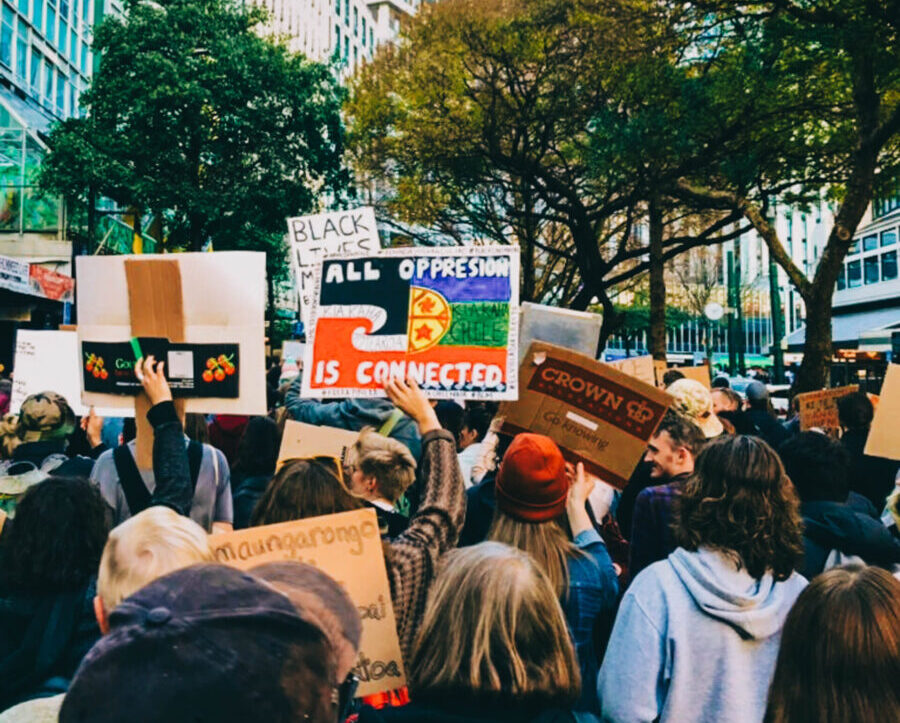2020 was a year with radical potential. That June, New Zealand was in a very stringent COVID lockdown. It was actually illegal to drive unless you were going to or from the grocery store.
But following George Floyd’s on-camera murder at the hands of police, more than 20,000 of us showed out in Wellington for the protest. It was one of dozens of protests like it across New Zealand.
If you’ve ever been part of the activist scene, these messages of solidarity are nothing new. All oppression is connected — a belief, as well as the kernel of a political strategy built on logical chains of equivalence.
What remains less specified — and is sometimes in dispute — is how we draw out the connections that bind us. How should we relate various forms of oppression to each other? And how should we go about remedying the insecurity we face in the world based on our understanding of connection?
A Generational Divide
The degree to which Boomers and Gen Xers vibe with this way of seeing the world is hit or miss. I don’t usually like making much of generational distinctions, but in this case, the vibe of the elders is a stark contrast with my sense of how younger generations view the world. That’s why there was a massive generational divide in an NPR poll about US views of Israel, taken on Oct. 13, 2023, just after the Hamas attack but before Israel had imposed a siege on two million souls in Gaza.

Keep in mind, this is before the Israeli siege, which further curdled the public mood against Israel.
Even so, as the chart shows, the poll found huge discrepancies in what Americans thought the US government’s posture toward Israel should be. Gen Z and Millennials were the least supportive of Israel and the most critical of Israel…by a lot. The older the respondent, the more likely they were to hold the opposite view.
But this should be unsurprising. The shared threats Gen Z/Millennials see — specifically climate change and nuclear war — not only persist but were created by their parents and grandparents.
Worse, they see their parents’ and grandparents’ generation hoarding power at the top of society, keeping secrets from the public, and persisting with policies that make their existential concerns worse. And in a world where younger folks’ opportunities are far scarcer than they were for their elders and debt burdens far greater, they find self-interest in recognizing shared injustice. For many, it’s taken as a given that all oppression is connected.
All this comes to a head in two vital ways.
The Pacific’s Missing Peace Argument
One, there was a UN General Assembly vote on a resolution to call for an Israeli and Hamas ceasefire and for the “Protection of civilians and upholding legal and humanitarian obligations.” The resolution passed, but the amendment to condemn Hamas’s attack on Israel did not.
It’s ridiculous that the amendment condemning Hamas’s attack could not be included, but also ridiculous is that the United States used the absence of blame-y language to vote against a straightforwardly clean declaration for member states to uphold international law and provide humanitarian assistance in Gaza.
Even more troubling though is that most Pacific nations either abstained from or voted against the clean resolution. For some Pacific nations, UN voting is simply a function of falling within America’s sphere of influence. The whole point of sphere of influence arrangements is that the controlling power controls to the exclusion of others, so those nations, of course, are going to align with US choices.
Smaller powers like the Pacific Island nations have no power but their moral authority, their solidarity with others, and their unity in relation to outside powers. For the Pacific to dissociate from a resolution that recognizes all oppression as being connected is to deny themselves one of their greatest power resources.
However, all Pacific nations are not subjected to America’s exclusionary control, and those who exercised their independence by not supporting the resolution were effectively rejecting the view that all oppression is connected. That’s a problem because the Pacific strives to be a zone of peace. Yet, as I lamented recently, I’ve yet to see a theory of peace — an argument explaining how — to match their ambitions. I don’t know how you get to any kind of peace in a dark, dark world without the starting point of a greater human solidarity. To put it differently, the Pacific will never secure peace in its region by opposing or abstaining from the basic protection of civilians in other regions.
Smaller powers like the Pacific Island nations have no power but their moral authority, their solidarity with others, and their unity in relation to outside powers. For the Pacific to dissociate from a resolution that recognizes all oppression as being connected is to deny themselves one of their greatest power resources.
This Could Kill Biden’s Re-Election
The other vital way that the generational divide matters when we look out at an insecure world is that it could very well end the Biden presidency.
Growing numbers of Democrats are refusing to vote for a president who declares unwavering support for Israel even when it commits indiscriminate bombing of Gaza as part of a war that flagrantly afflicts Palestinian civilians in violation of international law.
Jonathan M. Katz reported in his newsletter:
“In the latest Gallup poll, Biden’s approval rating fell 11 points among Democrats and two points among independents, pushing him to a tie for his all-time lowest rating at 37%. His intraparty approval rating is still high, at 75%. But heading into a 2024 election that everyone predicts to be extremely tight, the defection of even an appreciable number of young and nonwhite voters at the core of his base could spell doom. And this, in an election whose results could ultimately decide whether the United States remains a democracy.”
President Joe Biden is neck and neck with President Donald Trump in head-to-head polling, and in earlier polls, he’s actually been projected to lose by a couple of points. This matters in the sense that Biden clearly needs every vote he can get, and instead it looks like he’s politicking with Israel while hemorrhaging votes at home.
Biden’s response has not only alienated the youth vote; it’s totally alienated the Arab-American community. A group of organizers has even started a snowballing petition declaring they will not vote for Biden until he changes US policy toward Israel.
American exceptionalism has metastasized into a pro-Israeli exceptionalism that has left the Democratic Party unable to even act in its own interests. By not seeing that all oppression is connected, they have pursued a generation of policies in the Middle East that puts it on the side of a colonial power. Americans who are increasingly realizing this won’t stand for it.
Biden will not beat Trump by spurning the core demands of younger generations and Arab-Americans alike. And that means American democracy itself hinges on recognizing that all oppression is connected.





















